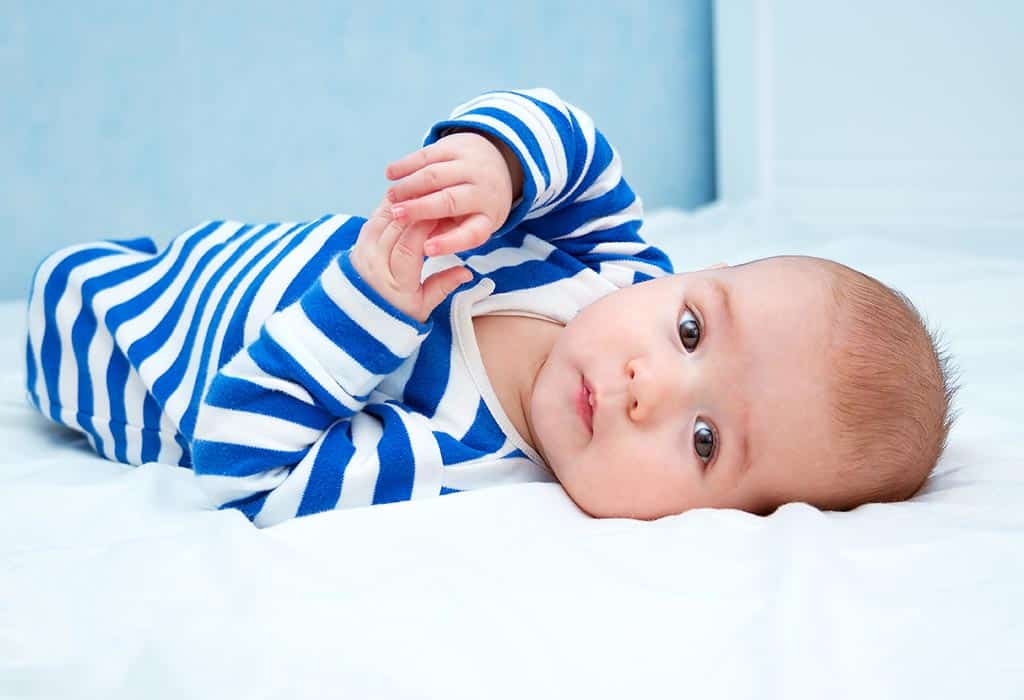
Table of Contents
Do you notice a little white tooth shining through your baby’s smiles? The best teething toys and the best baby burp cloths to deal with all the 17th-week drool!
At 17 weeks, watching your baby just grow, day by day, and develop into a human being of their own may be quite overwhelming. You may still have memories of them being a little baby who couldn’t even open their eyes so fresh in your mind and they already are smashing developmental milestones every day!
Your 17-week-old baby's development and physical growth
There is a lot happening with your baby at week 17. Their growth spurt will be on a whole new range and there will be a whole new spectrum of things they’ll begin understanding.
1. Your baby's weight
At week 17, you can expect your baby to weigh TWICE as much as they did when they were born. That was pretty quick, eh? You will not only be able to see this difference on the weighing scale but also in their physical appearances like in areas of their tummy and the face!
2. Your baby's reflexes
The rolling will continue! Your little one will continue to roll on their tummy and now that their chest, back, and neck would have become much stronger than before, the rolling will be more prominent. For babies who were not rolling before, this week is the week to look out for! Your baby will also now be more and more captivated with their surroundings each passing day and will exhibit an eagerness to interact with strangers.
3. Your baby's heightened senses
You can now also expect your baby’s sense of sight, smell, and sound to increase. As all these senses develop, so will their understanding of the world as well. You may even see a reactive expression if you wear a perfume unfamiliar to them or a dress you’ve never worn before! Apart from the five senses responsible for your baby’s better eyesight, your baby’s cognitive development, hand-eye coordination and ability to hold/grab things will now gradually begin to improve too.
4. Your baby's feed
17 weeks after birth, your baby’s stomach will become bigger but their feed or the diet will slightly reduce than what it was before. It is your individual choice to use formula milk, solid foods, or your own breast milk; however, it may be noted that breastmilk is always the recommended choice as it naturally contains nutrients that help babies fight off infections. They will also be constantly distracted by everything happening around them owing to their budding curiosity. Hence, it will be a good idea to try to feed your baby in a silent place with minimal distractions for them to have to pay attention to.
5. Your baby's language and communication skills
Believe it or not, your baby will already be starting to understand the sound of the native language you and your partner/ family communicate in at home! You may also notice them trying to make sounds other than the usual cooing, most likely vowel sounds repeating in multiple tones and sounds. You may also further notice your baby shows an increased interest/fascination in your face. Though you may want to believe it is because they find you a beautiful parent, it is in fact because they are trying to understand the movement of your lips which will later help them understand and make words. That said, don’t get too excited yet as their first words are not coming out anytime before 12 and 15 months. However, they may make a clicking sound as a signal to grab your attention.
6. Your baby's sleep
At week 17, it will not be easy to put your baby to sleep at all. They will be so highly distracted and stimulated at any point in the day that even the slightest of noises may urge them to wake up and lose sleep. With your baby’s erratic sleep habits, it would only be wise for you, as the parent to say goodbye to the hope or idea of getting your good old 7-hour nap. You may want to remove all digital devices and place your baby’s crib in an area with minimal noises and sounds to help them fall asleep and continue sleeping for longer. Also, if you think wrapping them up in a sling of a baby wrap may have them fall asleep, be prepared to be amazed at how quickly your baby pokes his hands and legs out of the wrap!
Your 17-week-old baby's health
1. Tests and vaccinations
Most of the essential vaccinations for your baby, especially the ones to do with their immunization, would have already been administered by now. At week 17, the only vaccinations your baby will have to be given would be the ones you either missed earlier or those which have some special purpose with regards to your baby’s subjective health.
2. Health conditions to worry about
If your baby is on their usual development of milestone achievement track, there shouldn’t be a reason for you to visit the doctor. Some babies who may not be able to conform to what is supposed to be the ‘ideal’ growth curve, may actually be genuinely slow learners and you may actually not have anything to worry about there as well. However, if your baby is not doing the regular baby things like being able to gain some control on their head movement or are displaying an inability to respond to your voice or if they show no reaction at all, it may be a good idea to see your pediatrician and just be double sure.
3. Teething in week 17
Most babies do not show a tooth at least until the 6th month but some may even show their first signs of teething as early as the 4th month or the 16th/17th-week post-birth. Excessive drool, unnecessarily fussy behavior, reddish gums, and a mild fever are the first signs of teething in babies that you may need to keep an open eye for. Most babies get used to the process of teething and may even not bother you a lot after the initial few days but if you are worried as a parent, buying some baby teething toys or a pediatrician-prescribed infant-safe pain reliever such as acetaminophen at night may help.
Final Thoughts
If you’ve already had a baby before your newborn who is 17 weeks now, in good news, your 4-month-old baby will be delighted to have a sibling of their own! At this age, babies typically tend to start recognizing faces other than that of parents. Since siblings would give more enthusiastic responses than those given by parents, babies will tend to show heightened fascination and excitement around their older siblings. Babies may even particularly wave, kick or giggle in excitement when they see their siblings.
In other bad news, however, the older sibling may not like the idea of you paying so much attention to this new baby and so, keeping an active eye out to identify and resolve sibling jealousy or insecurities is recommended. We recommend you take some time out for the elder sibling and do not make them feel less important. You may even try involving them in baby care. You could also try and keep some special toys aside for the big sibling and perhaps, let them do everything they can while the infant cannot, like allowing them to watch some extra hours of TV or ordering a pizza when they want to. This will not only keep them happy and engaged but will also help them feel more secure and loved!
FAQs- Your 17-Week-Old Baby: Development, Growth, Health, Postpartum, New Baby Tips & Recommended Products
1. How much should a 17-week old baby sleep?
2. Should you wake a sleeping newborn for feeding?
3. Can newborns smell their mom?
Reviewed By-

Nimrat, Pediatrics
Dr. Nimrat S Sidhu is a practicing pediatrician for about 5 years now and holds an MD pediatrics degree. She was the topper of her batch, has always had a keen interest in her core medical field, and is specially trained for neonatal resuscitation.





